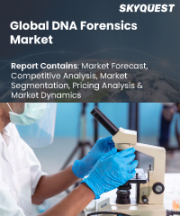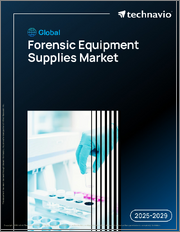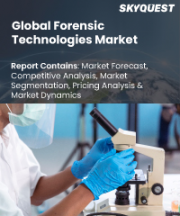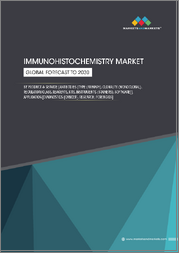
|
시장보고서
상품코드
1898047
DNA 포렌식 시장 : 규모, 점유율, 성장 분석, 솔루션별, 수법별, 용도별, 최종 사용자별, 지역별, 업계 예측(2026-2033년)DNA Forensics Market Size, Share, and Growth Analysis, By Solution (Kits, Analyzers and Sequencers), By Method (Capillary Electrophoresis, Next Generation Sequencing (NGS)), By Application, By End-user, By Region - Industry Forecast 2026-2033 |
||||||
세계의 DNA 포렌식 시장 규모는 2024년에 37억 달러로 평가되었고, 2025년 40억 6,000만 달러에서 2033년까지 85억 8,000만 달러로 성장할 전망입니다. 예측기간(2026-2033년) CAGR은 9.8%를 나타낼 전망입니다.
세계의 DNA 포렌식 시장은 유전자 분석 기술의 진보와 법 집행 기관이나 부모와 자식 감정에서의 이용 확대를 배경으로 현저한 성장을 이루고 있습니다. DNA 프로파일링, 시퀀싱, 데이터베이스 구축 등의 서비스는 범죄 수사 및 시체의 신원 확인에 중요한 역할을 하고 있습니다. 또한 바이오테크놀러지 부문의 성장과 감식 능력 강화를 목적으로 한 정부의 지원책이 시장 확대를 추진하고 있습니다. DNA 표현형 분석과 조상 추정과 같은 새로운 용도는 기존 방식으로는 어려운 사건 해결을 가능하게 하기 위해 법 집행 기관 내에서 주목을 받고 있습니다. 그러나 프라이버시, 윤리, 데이터 관리와 관련된 문제는 잠재적인 장벽이 될 수 있습니다. 전반적으로 지속적인 혁신과 다양한 용도 부문을 지원하며 시장은 지속적인 성장을 향한 좋은 위치에 있습니다.
세계의 DNA 포렌식 시장 성장 촉진요인
차세대 시퀀싱을 포함한 DNA 시퀀싱 기술의 지속적인 발전은 DNA 샘플 분석의 효율성과 정확성을 크게 향상 시켰습니다. 이 진보는 감각 DNA 분석의 가능성을 넓히고, 보다 상세한 개인 프로파일링과 복잡한 사건의 해결을 가능하게 하고 있습니다. 게다가, 열화한 DNA나 미량의 DNA를 검사하는 능력의 향상에 의해 DNA 포렌식의 적용 범위가 확대되어, 일상적인 수사로부터 곤란한 상황까지, 이러한 기술이 불가결한 것이 되고 있습니다. 그 결과 이러한 혁신적인 솔루션에 대한 수요는 세계 DNA 포렌식 시장에서 계속 증가하고 있습니다.
세계 DNA 포렌식 시장 억제
세계의 DNA 포렌식 시장은 DNA 샘플의 수집과 응용과 관련된 윤리 및 프라이버시 문제에 대한 심각한 과제에 직면하고 있습니다. 유전자 정보의 악용 가능성, 구체적으로는 비승인에 의한 개인 의료 기록에의 액세스나 유전자 표적형 생물무기의 개발 가능성 등에 대한 우려가 여전히 존재하고 있습니다. 이 상황은 DNA 포렌식의 장점을 활용하는 것과 개인의 프라이버시 권한을 보호하는 사이의 미묘한 균형을 필요로 합니다. 악용 위협은 이해관계자가 복잡한 윤리적 고려사항을 다루면서 감식적 응용에 대한 공중의 신뢰를 유지하기 위해 노력해야 하기 때문에 시장 성장에 큰 장벽이 되고 있습니다.
세계 DNA 포렌식 시장 동향
세계의 DNA 포렌식 시장에서는 차세대 시퀀싱(NGS) 기술의 급속한 진보에 견인된 현저한 동향이 관찰되고 있습니다. 이 기술 혁신을 통해 보다 빠르고 비용 효율적인 DNA 분석이 가능해졌으며, 인지 실험실은 대량의 유전 데이터를 높은 정밀도와 효율로 처리할 수 있게 되었습니다. NGS 기술의 향상에 따라 열화된 DNA 샘플과 혼합 DNA 샘플의 분석이 가능해져 미해결 사건의 해결이나 한정된 생물학적 재료에 의한 과제의 극복에 매우 유용합니다. 그 결과 고도감지 솔루션에 대한 수요가 급증하고 있으며, NGS는 감식과 범죄수사의 지속적인 진화에 있어서 중요한 요소로서의 지위를 확립하고 있습니다.
자주 묻는 질문
목차
소개
- 조사의 목적
- 조사 범위
- 정의
조사 방법
- 정보 조달
- 2차 자료 및 1차 자료 수집 방법
- 시장 규모 예측
- 시장의 전제조건과 제한
주요 요약
- 세계 시장 전망
- 공급과 수요 동향 분석
- 부문별 기회 분석
시장 역학과 전망
- 시장 규모
- 시장 역학
- 성장 촉진요인과 기회
- 억제 요인과 과제
- Porter's Five Forces 분석
주요 시장 인사이트
- 중요성공요인
- 경쟁도
- 주요 투자 기회
- 시장 생태계
- 시장의 매력 지수(2025년)
- PESTEL 분석
- 거시경제지표
- 밸류체인 분석
- 가격 분석
- 이용 사례
- 기술진보
- 규제 상황
세계의 DNA 포렌식 시장 규모 : 솔루션별 & CAGR(2026-2033년)
- 키트
- 분석기 및 시퀀서
- 소프트웨어
- 소모품
세계의 DNA 포렌식 시장 규모 : 수법별 & CAGR(2026-2033년)
- 모세관 전기 영동
- 차세대 염기서열 분석(NGS)
- 중합효소 연쇄반응(PCR) 증폭
세계의 DNA 포렌식 시장 규모 : 용도별 & CAGR(2026-2033년)
- 범죄 수사용 검사
- 친자 및 가족 관계 검사
- 재해 피해자 신원 확인
- 기타
세계의 DNA 포렌식 시장 규모 : 최종 사용자별 & CAGR(2026-2033년)
- 법 집행 기관
- 감식 실험실
- 연구기관
- 기타
세계의 DNA 포렌식 시장 규모 & CAGR(2026-2033년)
- 북미
- 미국
- 캐나다
- 유럽
- 독일
- 스페인
- 프랑스
- 영국
- 이탈리아
- 기타 유럽
- 아시아태평양
- 중국
- 인도
- 일본
- 한국
- 기타 아시아태평양
- 라틴아메리카
- 브라질
- 기타 라틴아메리카
- 중동 및 아프리카
- GCC
- 남아프리카
- 기타 중동 및 아프리카
경쟁 정보
- 상위 5개사 비교
- 주요 기업의 시장 포지셔닝(2025년)
- 주요 시장 기업이 채택한 전략
- 최근 시장 동향
- 기업의 시장 점유율 분석(2025년)
- 주요 기업의 기업 프로파일
- 기업의 상세
- 제품 포트폴리오 분석
- 기업의 부문별 점유율 분석
- 수익의 전년대비 비교(2023-2025년)
주요 기업 프로파일
- Agilent Technologies, Inc.(USA)
- EasyDNA(Ireland)
- F. Hoffmann-La Roche Ltd(Switzerland)
- GE Healthcare(USA)
- Thermo Fisher Scientific Inc.(USA)
- Illumina Inc.(USA)
- Promega Corporation(USA)
- QIAGEN(Germany)
- LGC Limited(UK)
- Eurofins Scientific(Luxembourg)
- NMS Labs(USA)
- Bode Technology(USA)
- Cellmark Forensic Services(UK)
- DNA Diagnostics Center(USA)
- LabCorp(USA)
- Forensic Science Service(UK)
- Sorenson Forensics(USA)
- Verogen, Inc.(USA)
- Gene by Gene, Ltd.(USA)
- Genomic Vision(France)
결론과 권고
SHW 26.01.14Global DNA Forensics Market size was valued at USD 3.7 Billion in 2024 and is poised to grow from USD 4.06 Billion in 2025 to USD 8.58 Billion by 2033, growing at a CAGR of 9.8% during the forecast period (2026-2033).
The global DNA forensics market is witnessing remarkable growth, driven by technological advancements in genetic analysis and heightened utilization in law enforcement and paternity testing. Services such as DNA profiling, sequencing, and databasing play crucial roles in criminal investigations and the identification of human remains. The market's expansion is further propelled by the biotechnology sector's growth and supportive government initiatives aimed at enhancing forensic capabilities. Emerging applications like DNA phenotyping and ancestry prediction are gaining traction within law enforcement, facilitating case resolutions where traditional methods fall short. Nonetheless, challenges regarding privacy, ethics, and data management pose potential obstacles. Overall, the market is well-positioned for continued growth, supported by ongoing innovations and diverse applications.
Top-down and bottom-up approaches were used to estimate and validate the size of the Global DNA Forensics market and to estimate the size of various other dependent submarkets. The research methodology used to estimate the market size includes the following details: The key players in the market were identified through secondary research, and their market shares in the respective regions were determined through primary and secondary research. This entire procedure includes the study of the annual and financial reports of the top market players and extensive interviews for key insights from industry leaders such as CEOs, VPs, directors, and marketing executives. All percentage shares split, and breakdowns were determined using secondary sources and verified through Primary sources. All possible parameters that affect the markets covered in this research study have been accounted for, viewed in extensive detail, verified through primary research, and analyzed to get the final quantitative and qualitative data.
Global DNA Forensics Market Segments Analysis
Global DNA Forensics Market is segmented by Solution, Method, Application, End-user and region. Based on Solution, the market is segmented into Kits, Analyzers and Sequencers, Software and Consumables. Based on Method, the market is segmented into Capillary Electrophoresis, Next Generation Sequencing (NGS) and Polymerase Chain Reaction (PCR) Amplification. Based on Application, the market is segmented into Criminal Testing, Paternity and Familial Testing, Disaster Victim Identification and Others. Based on End-user, the market is segmented into Law Enforcement Agencies, Forensic Laboratories, Research Institutions and Others. Based on region, the market is segmented into North America, Europe, Asia Pacific, Latin America and Middle East & Africa.
Driver of the Global DNA Forensics Market
The ongoing evolution of DNA sequencing technologies, including next-generation sequencing, has significantly enhanced the efficiency and precision of DNA sample analysis. This progression has broadened the horizons of forensic DNA analysis, allowing for more detailed individual profiling and the resolution of intricate cases. Furthermore, advancements in the ability to examine degraded or trace amounts of DNA have increased the applicability of DNA forensics across a wider array of situations, making these technologies crucial in both routine investigations and challenging scenarios. As a result, the demand for such innovative solutions continues to grow within the global DNA forensics market.
Restraints in the Global DNA Forensics Market
The Global DNA Forensics market faces significant challenges related to ethical and privacy issues surrounding the collection and application of DNA samples. Concerns persist about the potential for misuse of genetic information, including unauthorized access to private medical records and the possibility of developing genetically targeted bioweapons. This situation necessitates a delicate balance between harnessing the advantages of DNA forensics and safeguarding individual privacy rights. The threat of misuse poses a formidable barrier to the growth of the market, as stakeholders must navigate complex ethical considerations while striving to maintain public trust in forensic applications.
Market Trends of the Global DNA Forensics Market
The Global DNA Forensics market is witnessing a significant trend driven by rapid advancements in next-generation sequencing (NGS) technology. This evolution facilitates faster, more cost-effective DNA analysis, empowering forensic laboratories to handle and process larger volumes of genetic data with enhanced accuracy and efficiency. As NGS technology improves, it enables the analysis of degraded or mixed DNA samples, proving invaluable for solving cold cases and challenges posed by limited biological materials. Consequently, the demand for sophisticated forensic solutions is surging, positioning NGS as a crucial component in the ongoing evolution of forensic science and criminal investigations.
Table of Contents
Introduction
- Objectives of the Study
- Scope of the Report
- Definitions
Research Methodology
- Information Procurement
- Secondary & Primary Data Methods
- Market Size Estimation
- Market Assumptions & Limitations
Executive Summary
- Global Market Outlook
- Supply & Demand Trend Analysis
- Segmental Opportunity Analysis
Market Dynamics & Outlook
- Market Overview
- Market Size
- Market Dynamics
- Drivers & Opportunities
- Restraints & Challenges
- Porters Analysis
- Competitive rivalry
- Threat of substitute
- Bargaining power of buyers
- Threat of new entrants
- Bargaining power of suppliers
Key Market Insights
- Key Success Factors
- Degree of Competition
- Top Investment Pockets
- Market Ecosystem
- Market Attractiveness Index, 2025
- PESTEL Analysis
- Macro-Economic Indicators
- Value Chain Analysis
- Pricing Analysis
- Case Studies
- Technology Advancement
- Regulatory Landscape
Global DNA Forensics Market Size by Solution & CAGR (2026-2033)
- Market Overview
- Kits
- Analyzers and Sequencers
- Software
- Consumables
Global DNA Forensics Market Size by Method & CAGR (2026-2033)
- Market Overview
- Capillary Electrophoresis
- Next Generation Sequencing (NGS)
- Polymerase Chain Reaction (PCR) Amplification
Global DNA Forensics Market Size by Application & CAGR (2026-2033)
- Market Overview
- Criminal Testing
- Paternity and Familial Testing
- Disaster Victim Identification
- Others
Global DNA Forensics Market Size by End-user & CAGR (2026-2033)
- Market Overview
- Law Enforcement Agencies
- Forensic Laboratories
- Research Institutions
- Others
Global DNA Forensics Market Size & CAGR (2026-2033)
- North America (Solution, Method, Application, End-user)
- US
- Canada
- Europe (Solution, Method, Application, End-user)
- Germany
- Spain
- France
- UK
- Italy
- Rest of Europe
- Asia Pacific (Solution, Method, Application, End-user)
- China
- India
- Japan
- South Korea
- Rest of Asia-Pacific
- Latin America (Solution, Method, Application, End-user)
- Brazil
- Rest of Latin America
- Middle East & Africa (Solution, Method, Application, End-user)
- GCC Countries
- South Africa
- Rest of Middle East & Africa
Competitive Intelligence
- Top 5 Player Comparison
- Market Positioning of Key Players, 2025
- Strategies Adopted by Key Market Players
- Recent Developments in the Market
- Company Market Share Analysis, 2025
- Company Profiles of All Key Players
- Company Details
- Product Portfolio Analysis
- Company's Segmental Share Analysis
- Revenue Y-O-Y Comparison (2023-2025)
Key Company Profiles
- Agilent Technologies, Inc. (USA)
- Company Overview
- Business Segment Overview
- Financial Updates
- Key Developments
- EasyDNA (Ireland)
- Company Overview
- Business Segment Overview
- Financial Updates
- Key Developments
- F. Hoffmann-La Roche Ltd (Switzerland)
- Company Overview
- Business Segment Overview
- Financial Updates
- Key Developments
- GE Healthcare (USA)
- Company Overview
- Business Segment Overview
- Financial Updates
- Key Developments
- Thermo Fisher Scientific Inc. (USA)
- Company Overview
- Business Segment Overview
- Financial Updates
- Key Developments
- Illumina Inc. (USA)
- Company Overview
- Business Segment Overview
- Financial Updates
- Key Developments
- Promega Corporation (USA)
- Company Overview
- Business Segment Overview
- Financial Updates
- Key Developments
- QIAGEN (Germany)
- Company Overview
- Business Segment Overview
- Financial Updates
- Key Developments
- LGC Limited (UK)
- Company Overview
- Business Segment Overview
- Financial Updates
- Key Developments
- Eurofins Scientific (Luxembourg)
- Company Overview
- Business Segment Overview
- Financial Updates
- Key Developments
- NMS Labs (USA)
- Company Overview
- Business Segment Overview
- Financial Updates
- Key Developments
- Bode Technology (USA)
- Company Overview
- Business Segment Overview
- Financial Updates
- Key Developments
- Cellmark Forensic Services (UK)
- Company Overview
- Business Segment Overview
- Financial Updates
- Key Developments
- DNA Diagnostics Center (USA)
- Company Overview
- Business Segment Overview
- Financial Updates
- Key Developments
- LabCorp (USA)
- Company Overview
- Business Segment Overview
- Financial Updates
- Key Developments
- Forensic Science Service (UK)
- Company Overview
- Business Segment Overview
- Financial Updates
- Key Developments
- Sorenson Forensics (USA)
- Company Overview
- Business Segment Overview
- Financial Updates
- Key Developments
- Verogen, Inc. (USA)
- Company Overview
- Business Segment Overview
- Financial Updates
- Key Developments
- Gene by Gene, Ltd. (USA)
- Company Overview
- Business Segment Overview
- Financial Updates
- Key Developments
- Genomic Vision (France)
- Company Overview
- Business Segment Overview
- Financial Updates
- Key Developments



















